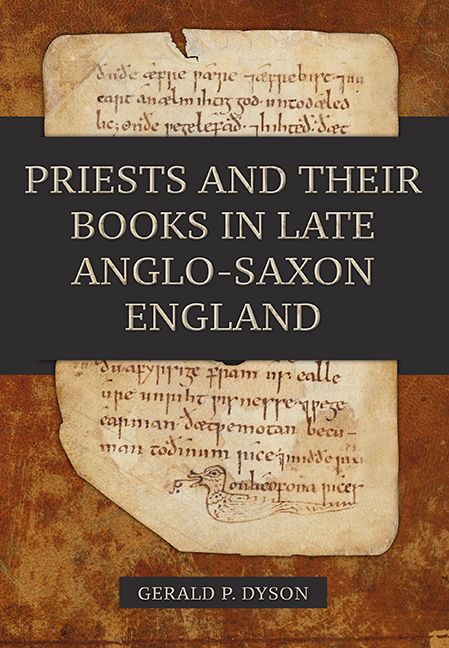Book contents
- Frontmatter
- Dedication
- Contents
- List of Illustrations
- Acknowledgements
- Introduction
- 1 Priests, Books, and Pastoral Care
- 2 “Ne cunnon þæt leden understandan”: Issues of Clerical Literacy
- 3 Demand and Supply: Production and Provision of Books for Priests
- 4 Preaching and Homiletic Books for Priests
- 5 Performing the Liturgy: Priests’ Books for the Mass and Office
- 6 Locating Penitentials, Manuals, and Computi
- Conclusions
- Appendix
- Bibliography
- Index
- Anglo-Saxon Studies
2 - “Ne cunnon þæt leden understandan”: Issues of Clerical Literacy
Published online by Cambridge University Press: 12 June 2021
- Frontmatter
- Dedication
- Contents
- List of Illustrations
- Acknowledgements
- Introduction
- 1 Priests, Books, and Pastoral Care
- 2 “Ne cunnon þæt leden understandan”: Issues of Clerical Literacy
- 3 Demand and Supply: Production and Provision of Books for Priests
- 4 Preaching and Homiletic Books for Priests
- 5 Performing the Liturgy: Priests’ Books for the Mass and Office
- 6 Locating Penitentials, Manuals, and Computi
- Conclusions
- Appendix
- Bibliography
- Index
- Anglo-Saxon Studies
Summary
Faciendi plures libros nullus est finis;
frequensque meditatio, carnis afflictio est.
– Ecclesiastes 12:12bIn 1222, the dean of Salisbury Cathedral visited and examined six priests who were serving in churches controlled by the dean and chapter. One priest was exempt from the examination as the examiners seem to have had prior knowledge or testimony of his ability, but the other five were asked about their ordination and tested on their liturgical and linguistic abilities. One of the examined priests was Simon, the chaplain serving at the village of Sonning, who had been ordained by Hugh, Bishop of Lincoln four years previously. When tested, he was able to read the passage from the gospel for the first Sunday in Advent, but was unable to understand what he had read. When tested on the text of the mass, he was familiar with it, but was unable to parse “Te igitur, clementissime Pater”. When pressed by the examiners to give an answer as to which word governs “Te”, he replied that “Pater” does, because the Father governs everything.
Though the events told in this historical anecdote took place a century and a half after the Norman Conquest, the concerns of ecclesiastical authorities in regard to the abilities of the parochial clergy changed little in the intervening period. Several monastic writers of the tenth and eleventh centuries, such as Alfric and Byrhtferth of Ramsey, appear pessimistic about the ability of the secular clergy to use Latin. But if priests were to fulfill duties as basic as celebrating mass and baptizing children, this required the use and performance of texts in Latin. There is a clear tension between characterizations of priests’ literacy (or lack thereof) and the pastoral responsibilities they were to carry out on a regular basis. Understanding this tension and moving towards a clearer view of late Anglo-Saxon clerical literacy requires a concise look at scholarly thought on literacy and the issues surrounding it and, most crucially, the contemporary evidence.
Issues of priestly literacy
The literacy of medieval priests has often been questioned and disparaged, with many twentieth-century scholars accepting a view of priests as “barely literate, barely celibate, barely sober bumpkins”, largely resulting from uncritical acceptance of monastic barbs aimed at the secular clergy.
- Type
- Chapter
- Information
- Priests and their Books in Late Anglo-Saxon England , pp. 43 - 79Publisher: Boydell & BrewerPrint publication year: 2019



